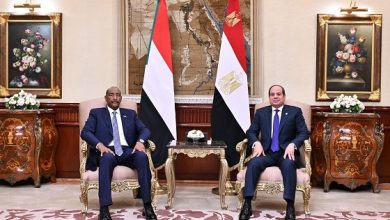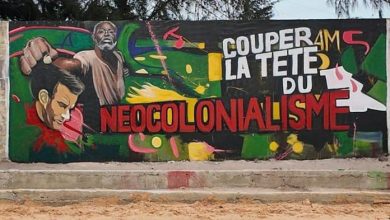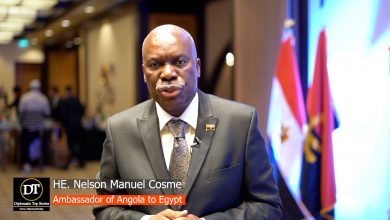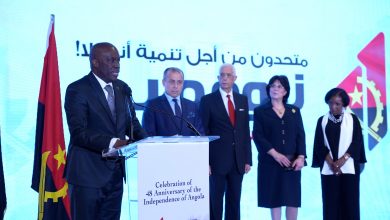Adesina outlines future vision for sustainable growth and climate resilience in key African Union speech | African Development Bank Group
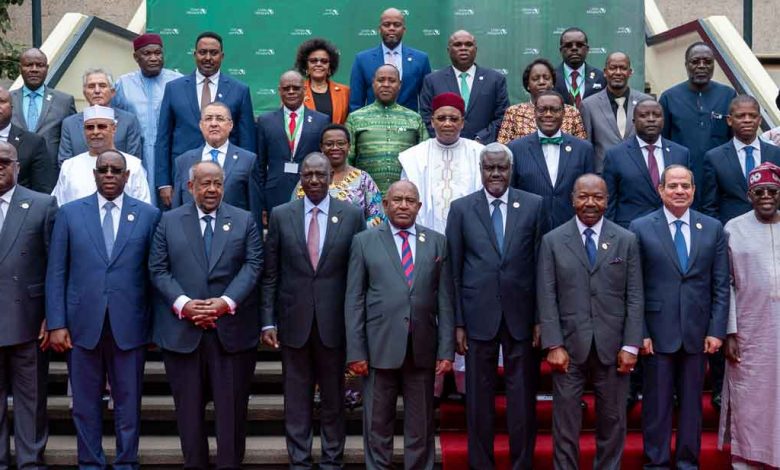
Diplomat.Today
The African Development Bank
2023-07-17 00:00:00
——————————————-
Dr. Akinwumi Adesina, president of the African Development Bank Group, outlined the bank’s significant achievements and commitments to Africa on Sunday, underscoring the bank’s determination to mobilize resources to drive economic transformation, climate resilience and addressing global warming, among other things. the continent’s debt problems.
Speaking at the 5th African Union (AU) Semi-Annual Coordination Meeting in Nairobi, Kenya, Adesina spoke about the bank’s significant investments, including spending $44 billion on regional and national infrastructure projects over the past seven years.
He said the bank’s 2019 overall capital raise from $93 billion to $208 billion — the highest ever in its history since its inception in 1964 — provided the bank with the financial firepower to strongly support Africa in coping and recovering of the Covid-19 pandemic.”
The Bank provided a Covid-19 response facility of up to $10 billion to support governments and the private sector in addressing the impact of the pandemic.
The meeting was attended by nine heads of state and government, African Union Commission Chair Moussa Faki Mahamat and United Nations Deputy Secretary-General Amina Mohammed. Also present were the heads of pan-African organizations and regional economic communities, and representatives of international agencies. The AU called the meeting under the theme “Accelerating the implementation of the African Continental Free Trade Area (AfCFTA).
Mobilizing resources for Africa
Reporting on the Bank’s efforts to mobilize resources, Adesina said that after two years of hard work, the African Development Bank, together with the Inter-American Development Bank, helped pioneer an innovative financial structure that met the technical requirements of the International Monetary Fund (IMF). special drawing rights (SDRs) through multilateral development banks.
Since last year, African leaders have been calling for an additional $100 billion in SDRs for the continent, with a portion of this channeled through the African Development Bank, which is a prescribed holder of SDRs.
The initiative, which has been praised by United Nations Secretary-General António Guterres and other world leaders, would enable the African Development Bank to leverage SDRs by a factor of four and provide significant resources for the continent.
Adesina told African leaders that their help was needed to strengthen the rematch of SDRs to the African Development Bank this year.
Alleviate Africa’s debt burden
He said the bank is proactively pursuing mechanisms and cooperating with the World Bank and IMF as well as bilateral creditors to manage Africa’s debt situation within the common G20 framework.
The G20 launched the common framework to coordinate debt reprofiling and restructuring by official and private creditors, including non-Paris Club lenders such as mainland China, India, Saudi Arabia, Kuwait and Turkey , to ensure fair burden sharing among all creditors . Chad, Ethiopia and Zambia have requested debt relief under the Common Framework.
“We must deal decisively with Africa’s mounting debt burden,” Adesina insisted, expressing concern over the continent’s total debt, which stands at $1.3 trillion. The cost of debt service reached $22 billion in 2022 and is expected to rise this year.
However, the bank president said Africa needed to change its approach to debt and called for an end to all natural resource-backed lending. He said: “They are not in the interest of Africa because they are not transparent. They underestimate resources and pledge national assets.” He said natural resource-backed lending has led to “predatory creditor lending practices that leave borrowing countries worse off.”
On mobilizing resources to tackle food insecurity in Africa, the bank president highlighted the January 2023 Dakar 2 food summit, which was attended by up to 34 heads of state and government, development partners, farmers and private sector agents. To date, the Bank has mobilized $72 billion to implement the food and agriculture supply pacts developed at the summit.
Adesina spoke about the outcome of the $1.5 billion food production contingency that the Bank launched in May 2022 in response to the Russo-Ukrainian war, which sent wheat and corn prices soaring globally and posed a threat of a food crisis in Africa. Many countries on the continent depend on the two countries for corn and wheat imports. Up to 44 countries benefit from the facility, which according to Adesina “supports 20 million farmers across the continent to produce 38 million tons of food.”
The head of the African Development Bank Group highlighted the impact of the 16th replenishment of the African Development Fund – the group’s concessional framework for Africa’s low-income countries – last year, which mobilized $8.9 billion for these countries. He said this was the highest replenishment since the Fund was established in 1972. He explained that the replenishment also included a special Climate action window to support climate resilience in low-income countries and fragile states, for which the Bank has mobilized USD 429 million.
Calls for unity, peace and self-reliance
In his remarks to open the session, Comoros President and current AU President Azali Assoumani said Africa must close its ranks to achieve its vision of an integrated, prosperous and peaceful continent.
Assoumani said: “In this increasingly turbulent world, more than ever we need to close ranks if we are to meet the challenges that are growing every day. that we will achieve an Africa that is reconciled to itself, prosperous and open to the world.”
The AU president praised the progress made in implementing the various pan-African initiatives, including the African Continental Free Trade Agreement (AfCFTA), to boost the continent’s vision of prosperity. He urged those member states that had not ratified the agreement to do so “as soon as possible”.
Assoumani urged African countries engaged in political conflicts to “silence their arms” for frank and sincere dialogue. “Through dialogue, we will succeed in reconciling our differences and overcoming the obstacles that stand in the way of our progress.”
Kenyan President William Ruto said Africa should take advantage of the current reform momentum at the AU to develop an effective capacity to bring about the much-desired pan-African transformation. He said that to do this, self-reliance was essential. He added that an efficient institutional architecture was also indispensable at the AU.
Ruto said: “It is my prayer that we finally make the right decision and build an organization that is fit for purpose, has the required finances, the needed voice and the leadership that can project Africa’s position much more clearly, with a strong voice so that we can take our place in the community of nations.”
Ruto bemoaned the current global financial architecture, saying part of Africa’s debt and liquidity challenges were caused by an unfair financial architecture. “We want a financial system that doesn’t portray Africa as risky,” he said, adding: “Today, Africa has $640 billion in debt, paying nearly $70 billion every year. It’s only fair that we have a have a financing mechanism that treats us equally.”
Ruto said the African Climate Change Summit, to be held in Nairobi in September, will provide the continent with a platform to take “a more robust stance and a more cohesive, transformed and inclusive global approach” to address the climate change crisis in the run-up to this year’s global climate crisis. climate summit, COP28, in Dubai.
The Kenyan president delighted his fellow leaders and delegates when he told them to really feel at home at the meeting because as scientists have proven, Kenya is where the earliest remains of man were found and where humanity began.
He then announced, “Kyanians are having a national conversation about whether we should have visas for everyone coming home (to Kenya).”
“So next time you come to Kenya you may not need a visa,” he added.
Amina Mohamed said Africa must have a strong voice in the G20, defining its innovation ideas and united action to disrupt the “unacceptable status quo”.
She said: “The continent faces a moment of reckoning when the world seems to be turning its gaze from Africa – we may seem dejected, but we are far from over, and as our leaders we continue to count on you to deliver a . to pave the way to delivering a vision for Africa that is anchored in the 2063 agenda.”
Mohamed again stressed the need for Africa to remain united with “no lines” between its leaders. “When the wall bursts, the lizard comes in,” she said, citing an African proverb to support the call for unity.
She also assured African leaders of the UN’s support: “The Secretary-General is calling loudly for SDG stimulus to address debt and distress, by increasing fiscal space by reallocating additional SDRs to the initiative of the African Development Bank and the reform of the global financial architecture. who today is morally bankrupt.”
In his welcome speech, Moussa Faki Mahamat said that Africa should continue to pursue its own solutions to its problems.
He noted that despite signs of the G20 opening up to the African Union, there is still a long way to go before the continent is truly involved in international political and financial decisions.
Mahamat praised the African Development Bank for its development interventions across Africa. “I am pleased to highlight with appreciation the initiatives taken by the African Development Bank under the leadership of our brother, Dr. Akinwumi Adesina, to fund regional integration,” he said.
He added that the African Development Bank had provided an additional $12 million in grants to the African Continental Free Trade Area Secretariat, on top of the $5 million grant from the AU, which previously helped establish the Secretariat.
Mahamat said, “One thing is certain: Africa cannot build its development ambitions on what others are doing for it.”
The 5th Semi-Annual Coordination Meeting of the African Union and the Regional Economic Communities and Regional Mechanisms is an important meeting aimed at improving coordination and alignment of continental development and integration agendas across different African institutions and stakeholders. The meetings started on July 13 and ended on July 16.
Read Dr. Adesina’s full speech here.
——————————————-
